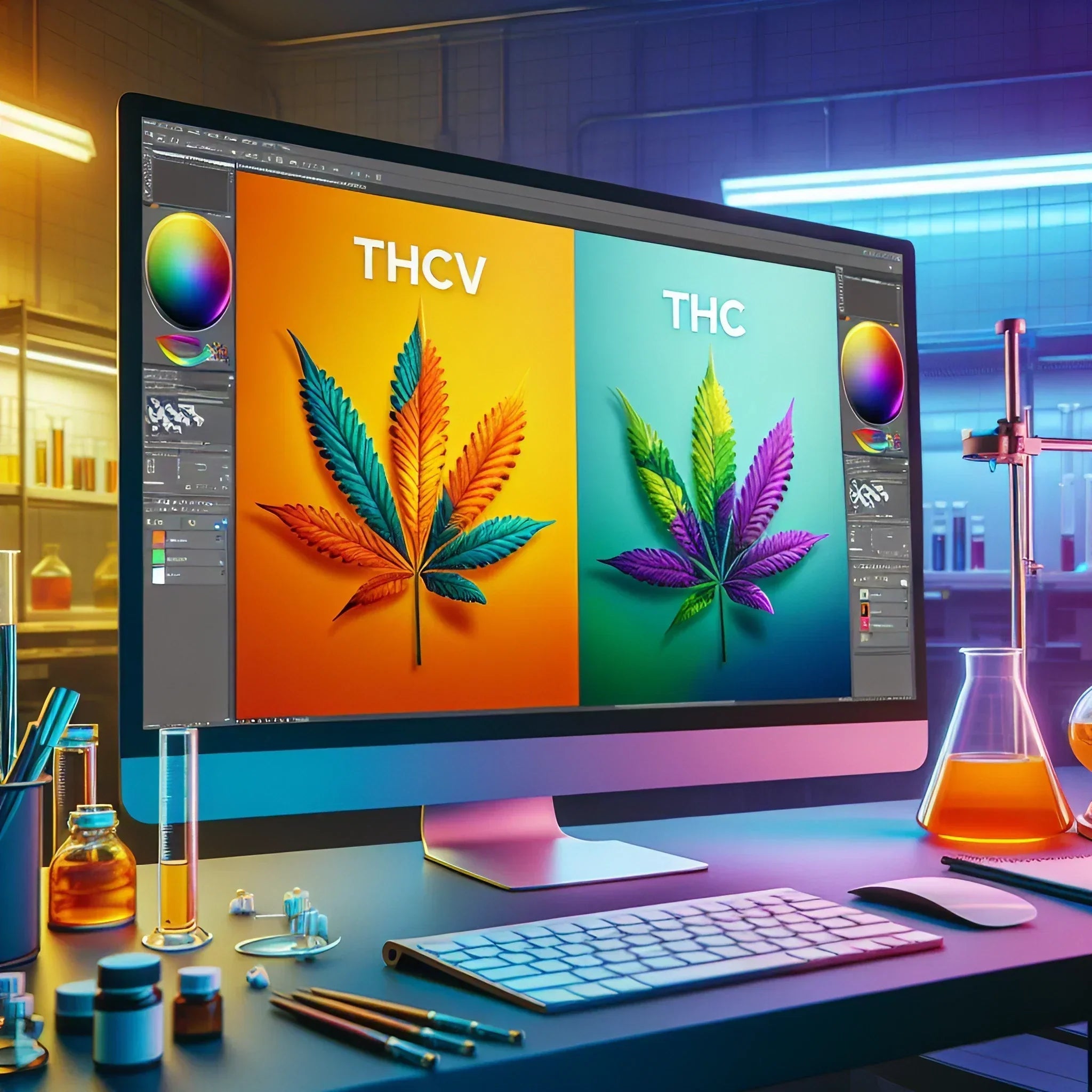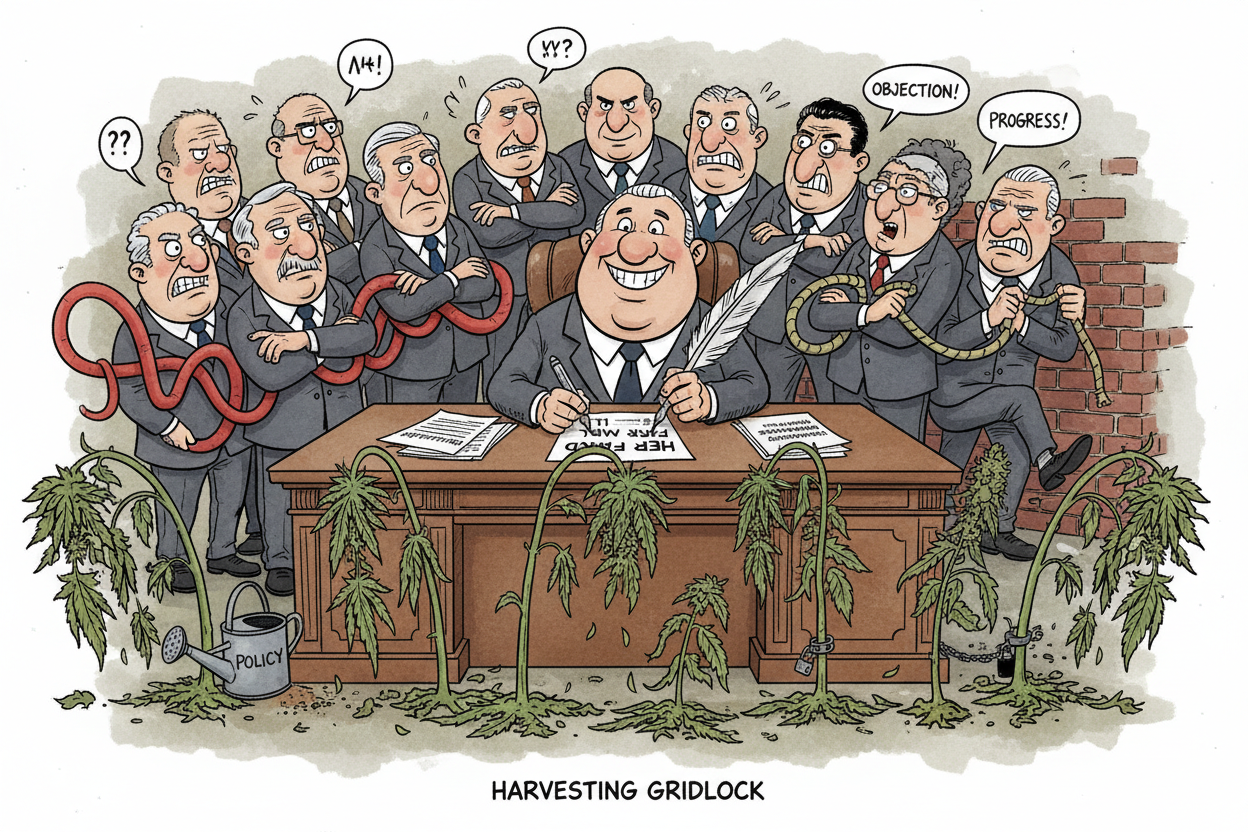Cannabis enthusiasts are always on the lookout for the latest and greatest cannabinoids. While THC is the household name synonymous with cannabis, “what is the difference between THC and THCv? How do these two compare? Is THCV stronger than THC? In this post, we will explore the potency and effects of THCV vs THC, highlighting their unique properties. By the end of this article, you'll have a better understanding of these cannabinoids and how they might fit into your cannabis routine.
Understanding The Difference Between THC and THCv
What is THC?
THC, or tetrahydrocannabinol, is the most well-known and researched cannabinoid in cannabis. It's the compound responsible for the euphoric "high" that users experience. THC interacts with the brain's cannabinoid receptors, primarily the CB1 receptor, resulting in various psychoactive effects.
Psychoactive Effects of THC
The psychoactive effects of THC include euphoria, relaxation, altered senses, and increased appetite. These effects can vary widely depending on the strain, dosage, and individual tolerance. THC is also known for its medicinal properties, helping with pain relief, nausea reduction, and sleep disorders.
THC Potency
THC potency is measured by its concentration in cannabis products. Higher THC levels generally lead to stronger effects. Typical cannabis strains range from 10% to 30% THC, with some concentrates reaching up to 90%. Consumers should start with a low dose and gradually increase as needed.
Exploring THCV
What is THCV?
THCV, or tetrahydrocannabivarin, is a lesser-known cannabinoid found in trace amounts in certain cannabis strains. While it shares a similar chemical structure to THC, THCV produces distinct effects. THCV interacts with both CB1 and CB2 receptors, but its binding affinity and effects differ from THC.
Is THCv Psychoactive?
The psychoactive effects of THCV are considered more subtle and stimulating compared to THC. Users often report increased energy, mental clarity, and appetite suppression. Unlike THC, which induces a strong high, THCV's effects are typically milder and shorter-lasting.
THCV Potency
THCV potency is less understood due to limited research and availability. However, its effects appear to be dose-dependent. Low doses of THCV may act as an antagonist to THC, reducing its psychoactive effects. Higher doses may produce mild euphoria and increased energy.
Comparing THC vs THCv: Is THCv Stronger than THC?
Psychoactive Differences
THC and THCV both interact with the endocannabinoid system but produce different psychoactive effects. THC is known for its strong euphoric high, while THCV offers a more clear-headed and energetic experience. For those seeking mild psychoactive effects without intense euphoria, THCV may be preferable.
THC vs THCv Medicinal Benefits
Both THC and THCV have potential medicinal benefits. THC is well-documented for pain relief, nausea reduction, and sleep aid. THCV shows promise in appetite suppression, blood sugar regulation, and bone growth stimulation. More research is needed to fully understand the therapeutic potential of THCV.
Side Effects of THCv vs THC
THC is known for side effects such as dry mouth, red eyes, and anxiety, especially at high doses. THCV's side effects are less pronounced and may include dry mouth and dizziness. Because THCV may reduce THC's psychoactive effects, it could mitigate some unwanted side effects of THC.
Unique Properties of THCV
Appetite Suppression
One of the unique properties of THCV is its potential to suppress appetite. This effect contrasts sharply with the "munchies" often associated with THC. Users seeking weight management or appetite control might find THCV beneficial.
Increased Energy
THCV is known for its stimulating effects, providing increased energy and mental clarity. This makes it an attractive option for daytime use or for those looking to enhance focus and productivity without the sedation often caused by THC.
Shorter Duration
Another distinctive feature of THCV is its shorter duration of effects. While THC's high can last several hours, THCV's effects are typically briefer. This allows users to experience the benefits without long-lasting impairment.
Where to Buy THCv
Availability
Due to its rarity, THCV is not as widely available as THC. However, interest in THCV is growing, and more products are entering the market. Look for cannabis strains high in THCV or concentrated THCV extracts.
Popular Strains
Some cannabis strains known for higher THCV content include Durban Poison, Doug's Varin, and Pineapple Purps. These strains can provide a more energetic and focused high.
THCV vs. THC for Different Users
Recreational Users
Recreational users seeking a strong euphoric high will likely prefer THC. However, those looking for a mild buzz with increased energy and focus may find THCV more appealing.
Medical Users
Medical users should consider their specific needs. THC is widely used for pain relief, nausea, and sleep disorders. THCV may be beneficial for conditions like obesity, diabetes, and osteoporosis. Consult with a healthcare professional for personalized advice.
New Users
For new cannabis users, starting with THCV might be less intimidating due to its milder effects. It's important to understand how each cannabinoid affects you personally and adjust your consumption accordingly.
How to Incorporate THCV and THC
Mixing Cannabinoids
Combining THC and THCV can provide a balanced experience. THCV's ability to counteract some of THC's effects can create a more controlled high. Experiment with different ratios to find what works best for you.
Consumption Methods
Both THC and THCV can be consumed through various methods, including smoking, vaping, edibles, and tinctures. Each method offers different onset times and durations, so choose one that aligns with your preferences and lifestyle.
Dosing Tips
Start with a low dose, especially if you're new to cannabis or trying a new cannabinoid. Gradually increase the dose while monitoring effects. Keep in mind that individual tolerance and sensitivity can vary widely.
Research and Development
Current Studies
Ongoing research is exploring the potential benefits and applications of THCV. Studies are investigating its role in weight management, diabetes, and neurological disorders. As more data becomes available, our understanding of THCV's potential will grow.
Future Prospects
The future of THCV in the cannabis industry looks promising. Increased interest and demand may lead to more availability and innovative products. Continued research will help unlock new therapeutic uses and refine existing ones.
Industry Trends
Trends in the cannabis industry show a growing interest in minor cannabinoids like THCV. Consumers are becoming more educated and seeking out specific cannabinoids for tailored experiences. This shift could drive further advancements in THCV products.
Conclusion
In the debate of THCV vs. THC, the answer isn't straightforward. Each cannabinoid offers unique benefits and effects suited to different needs and preferences. Whether you're a recreational user seeking a specific high or a medical user looking for targeted relief, understanding the differences between THCV and THC is crucial.
For those eager to explore the world of THCV, consider trying products that highlight this intriguing cannabinoid. And remember, the best approach is to start low and go slow, finding the perfect balance for your cannabis experience.
Ready to learn more about cannabinoids and enhance your cannabis knowledge? Stay tuned to our blog for the latest updates and insights.






Share:
Is THCV Legal in the United States?
Farm Bill 2024: Potential Impact on Consumers